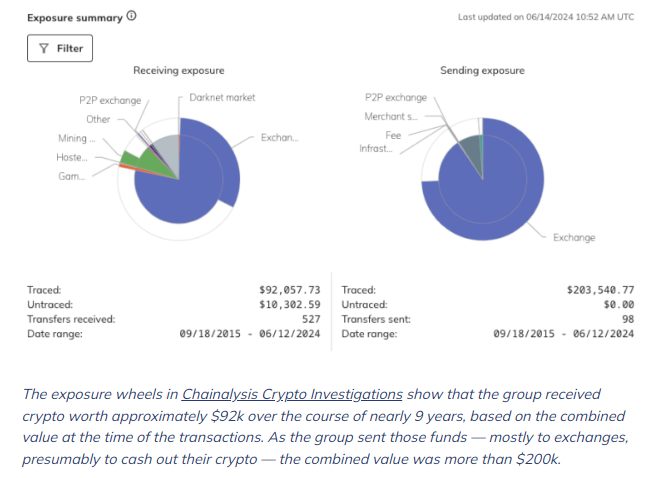The veil of anonymity often touted as a benefit of cryptocurrency has backfired spectacularly for extremist groups.
A new report by blockchain forensics firm Chainalysis reveals that the Nordic Resistance Movement (NRM), a white supremacist organization designated as a terrorist group by the US Treasury, has been using crypto donations to fund its activities for nearly a decade.
Traces Of Dirty Money On The Blockchain
Based on the study by Chainalysis, the NRM, established in Sweden in 1997, actively solicited cryptocurrency donations since at least 2015. This tactic likely arose from sanctions imposed on the group, hindering their access to traditional bank accounts.
The report details how the NRM garnered over $90,000 worth of crypto donations across various popular cryptocurrencies like Bitcoin, Ethereum, and Litecoin.

The most concerning aspect lies in the source of these donations. Chainalysis identified transactions originating from well-known, centralized cryptocurrency exchanges and even a mining pool. This raises serious questions about the effectiveness of anti-money laundering (AML) protocols employed by these platforms.
The presence of NRM activity on mainstream exchanges highlights a potential blind spot in how these platforms screen for illicit activity. While many exchanges have implemented KYC (Know Your Customer) procedures, it appears these may not be robust enough to catch all extremist fundraising efforts.

Crypto Regulation: Closing The Financing Faucet
The NRM case reignites the debate surrounding cryptocurrency regulation. While proponents hail crypto’s decentralized nature and financial freedom, this incident showcases its potential for misuse by those operating on the fringes.
Governments and regulatory bodies are now under pressure to find solutions that prevent extremist groups from exploiting crypto as a financial lifeline.
According to some observers, this situation underscores the urgency for tighter collaboration between law enforcement and crypto exchanges. Information sharing and coordinated efforts to identify suspicious activity on the blockchain are crucial to cutting off funding for these groups.
The Future Of Crypto And Combating Extremism
The NRM case serves as a stark reminder of the evolving tactics employed by extremist organizations. Law enforcement and regulatory bodies must adapt to the constantly shifting landscape of digital fundraising.
The anonymity associated with some cryptocurrencies presents a challenge. However, advancements in blockchain analysis tools are making it increasingly difficult for bad actors to hide their tracks. Collaboration between industry and government is key to ensuring crypto doesn’t become a haven for hate.
The fight against extremist financing requires a multi-pronged approach. While robust KYC protocols and information sharing are crucial, fostering transparency within the crypto ecosystem is equally important.
Featured image from The Media Lin, chart from TradingView















